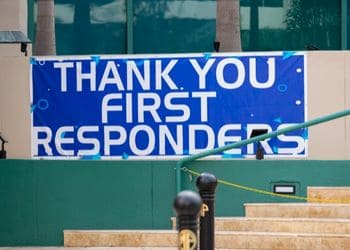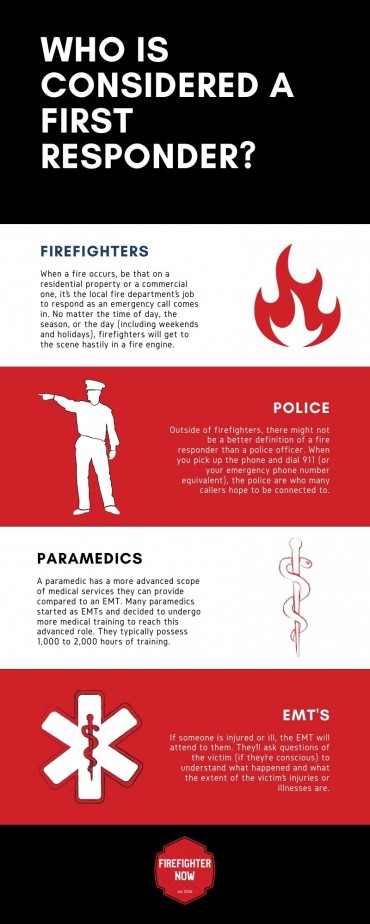You hear the term first responder all the time and might assume it refers to ambulatory services. You’re interested to know whether a first responder entails only those roles or others as well. Who is considered a first responder?

First responders typically include the following job roles:
- Firefighters
- Police
- Paramedics
- EMTs
In this article, I’ll talk more about what makes a first responder, including what their job responsibilities are. We’ll also talk about when and for how long a first responder is on call. You won’t want to miss it, so keep reading!
Table of Contents
Are Firefighters First Responders? Who Else Are First Responders?
The dictionary defines a first responder as “a person…who is among those responsible for going immediately to the scene of an accident or emergency to provide assistance.” These accidents can run the gamut from acts of random acts of violence, car accidents, natural disasters, fires, and other tragic events.
That definition is fairly broad, and when you consider that there’s no one federal term for what it means to be a first responder, the role can be perceived differently depending on who you ask.
That said, the following roles are considered generally accepted when you ask someone who a first responder is.
Firefighters
According to the U.S. Fire Administration or USFA, in 2019, up to 1,291,500 fires occurred in the country. This was a 3.2-percent decrease from 2010, but it’s still a lot of fires.
When a fire occurs, be that on a residential property or a commercial one, it’s the local fire department’s job to respond as an emergency call comes in. No matter the time of day, the season, or the day (including weekends and holidays), firefighters will get to the scene hastily in a fire engine.
Upon their arrival, the fire department will unleash their fire hoses and use pressurized water to control the fire. They’ll also ventilate the building, find trapped victims, and help as many of them escape as possible.

A firefighter must always save lives rather than property, but they’ll try to do both.
As we’ve talked about on the blog, firefighters have other responsibilities as well. When they have some downtime at the firehouse, they might visit schools and workplaces around their neighborhood to perform fire safety seminars.
In some cases, firefighters will also do odd jobs like fill pools or install car seats, but these are considered more antiquated roles of a firefighter. Due to liability risks, fire departments rarely offer these services anymore.
Police
Outside of firefighters, there might not be a better definition of a fire responder than a police officer. When you pick up the phone and dial 911 (or your emergency phone number equivalent), the police are who many callers hope to be connected to.
Police handle a wide range of matters that all fall under the umbrella of enforcing the law. They’ll respond to calls made to 911, patrol the streets looking for crime, and document events that surround a crime.
They also respond to service calls like welfare checks or unlocking a locked car door. I wrote an entire article on whether the fire department will unlock your car, click the link to check it out.
Everything from domestic disputes to dealing drugs, shootings, stabbings, burglaries, sexual assault, physical assault, and murder are areas the local police are trained and equipped to handle.
Once they confirm both sides of the story (provided a situation allows for that), the police will act accordingly. They might arrest perpetrators, issue fines, or give out a warning depending on the severity of the incident.
Police also do interrogations of potential criminals as well as sting operations and other covert missions. Many people know the police for their most unenviable of jobs, issuing traffic violations.
Like firefighters, police will also have community involvement, visiting schools and workplaces and informing the public about how to say no to drugs or how to safely cross the street.
EMTs
An emergency medical technician or EMT is a trained professional who, along with paramedics, can be the first to respond to an incident.
If someone is injured or ill, the EMT will attend to them. They’ll ask questions of the victim (if they’re conscious) to understand what happened and what the extent of the victim’s injuries or illnesses are.
They can facilitate the transportation of the victim to a hospital or medical care facility, usually by ambulance but also by helicopter too if the situation calls for it.
EMTs usually don’t work alone and will be accompanied by paramedics. That’s due to how an EMT’s responsibilities are limited. They can offer what is referred to as entry-level medical services.
For example, an EMT can administer oxygen, check a victim’s blood glucose, or do CPR.
Their job roles also include keeping victims calm so they don’t go into shock, treating external bleeding until arriving at the hospital, restraining a victim on the ambulance with a backboard, and tracking patient records.
Paramedics
A paramedic has a more advanced scope of medical services they can provide compared to an EMT. Many paramedics started as EMTs and decided to undergo more medical training to reach this advanced role. They typically possess 1,000 to 2,000 hours of training.
Paramedics will arrive with EMTs when someone calls 911 or an emergency number equivalent, as we touched on. An EMT might work on the patient first or a paramedic may; that differs on a case by case basis.
If a victim needs more advanced care, then a paramedic will be ready to step in. They can administer pacemakers, offer medications, and insert an IV line. If a victim needs a ventilation device or a breathing support tube, those are services that only a paramedic can do.
That’s true as well of treating collapsed lungs with a needle to the chest or using a tracheotomy to allow for breathing. Paramedics can even deliver babies, although that’s not a job responsibility they do frequently.
When Are First Responders on Call?
If you read our post on the work schedule of a firefighter, then you’ll recall how they might be scheduled to work for 12 or 14-hour shifts for several days in a row. The more popular and common schedule is 24-hour shifts.
When a firefighter gets to go home, they’re always considered on call. In other words, at any point, they could be required to come back to the fire department, put on their uniform, get on the truck, and respond to a fire.
Fires don’t sleep, after all, so when a firefighter is needed, they have to be ready to work. That’s a responsibility of their job.
It’s not at all that different for other first responders. Crime never sleeps either, so police officers must always be ready to be called into work. People need medical assistance at any time, which requires EMTs and paramedics to have to jump into action around the clock as well.
Those who decide to pursue these roles as a career choie must be aware that as a first responder, being on call is an ongoing part of their job. For firefighters at least, there are certain times of the year where fires don’t happen as much. However, medical responders and police officers might not have a lull like that.
Do First Responders Ever Get Time Off?
Despite the ongoing responsibility of their jobs, first responders do not work 24/7. No one can do that sustainably without burning themselves out. Then the first responder is likelier to make mistakes.
Unlike in other jobs, these mistakes can be deadly. That’s why time off is integral.
If a firefighter is working in 12 or 14-hour shifts, then they’d do this for several days in a row and then receive time off. The 24-hour shift schedule is followed by at least 72 hours of scheduled time away from the fire department.

Police officers might work 10-hour shifts for four days in a row. Then they’d have three consecutive days off.
Paramedics and EMTs will work a shifted schedule as well. Their days might be as few as eight hours and up to 12 hours. The average amount of hours worked per week is between 36 and 48, but overtime is often a responsibility of their jobs as well.
Some paramedics and EMTs will work 24-hour shifts like a firefighter does, followed by several days off.
We do want to mention two things. For one, a first responder’s time off isn’t like an office worker’s where they reliably get Saturdays and Sundays off every week. The two or three days off a first responder receives could be Monday, Tuesday, and Wednesday or Friday, Saturday, and Sunday. It all depends on when the first responder last worked.
Secondly, just as a reminder, a first responder can always be called into work, and that’s even during their time off. However, they’re usually given more time off later, at least for firefighters.
First responders include firefighters, EMTs, paramedics, and police officers. The brave men and women who decide to fulfill these roles are prepared for long hours, sometimes thankless work, difficult circumstances, and the unfortunate loss that can sometimes result.
The next time you see a first responder, be sure to give them your gratitude. It will make a difference!